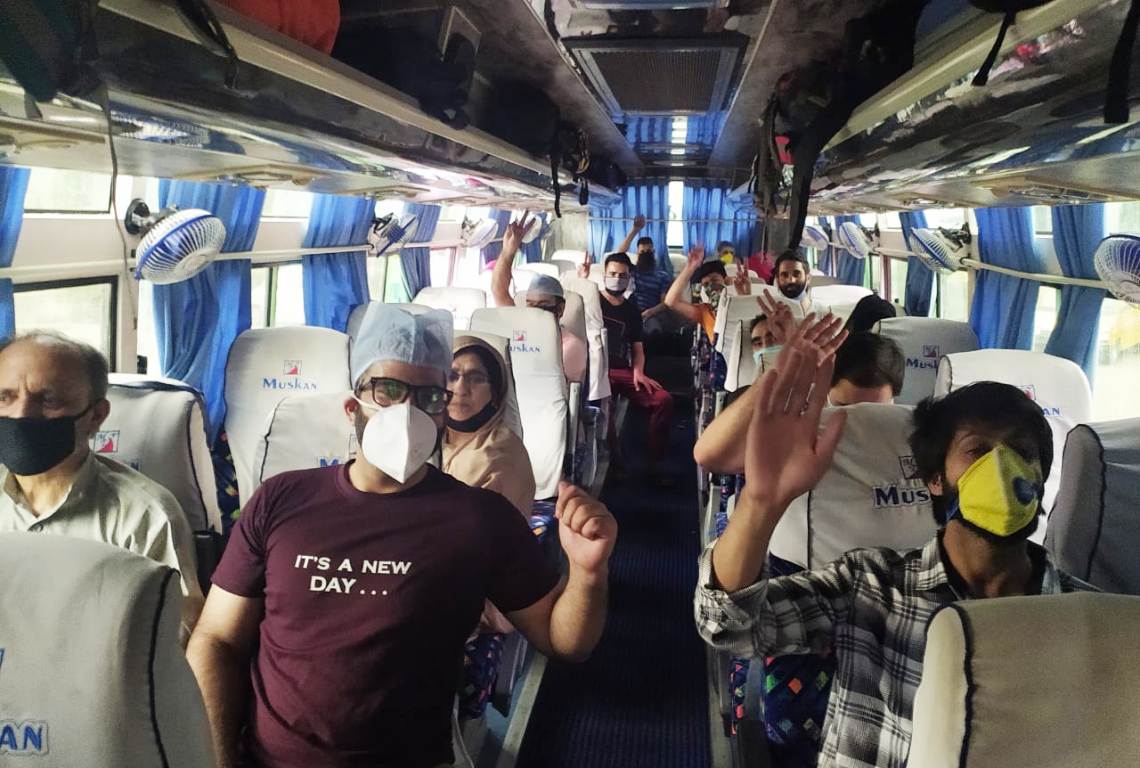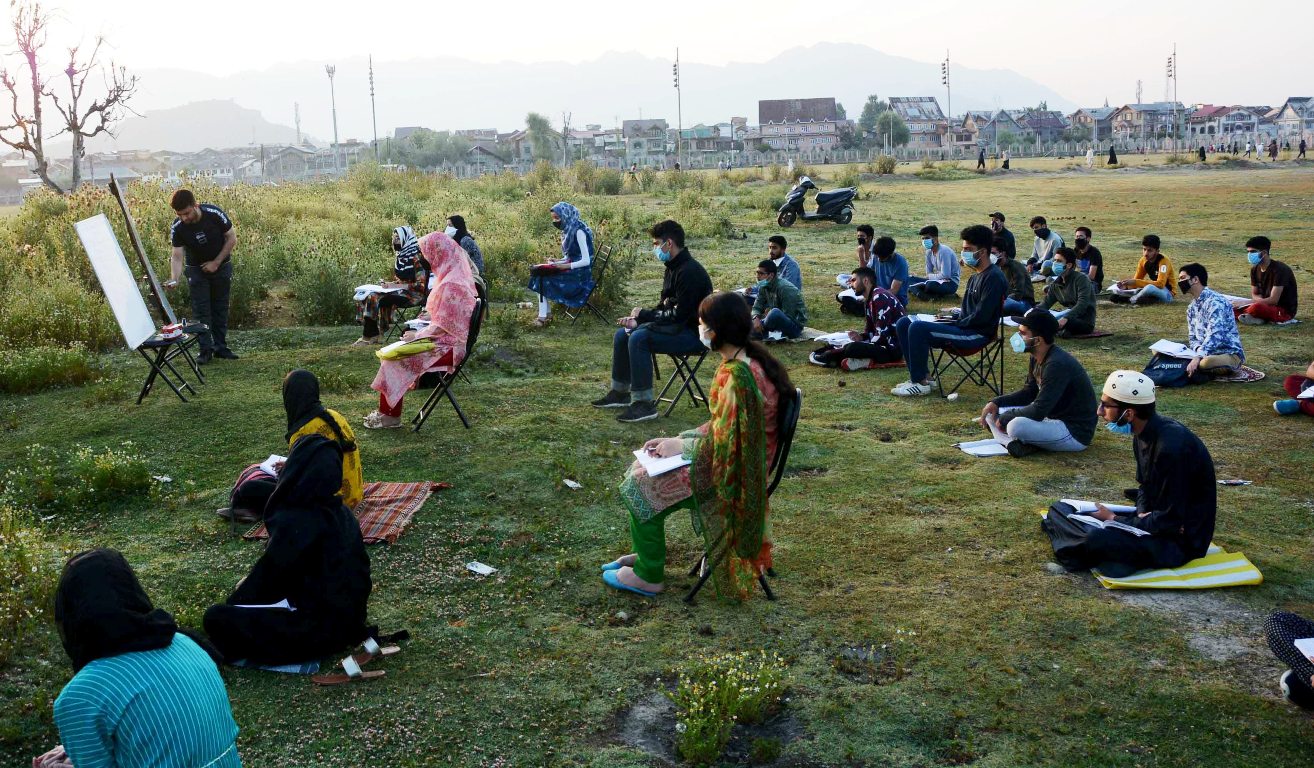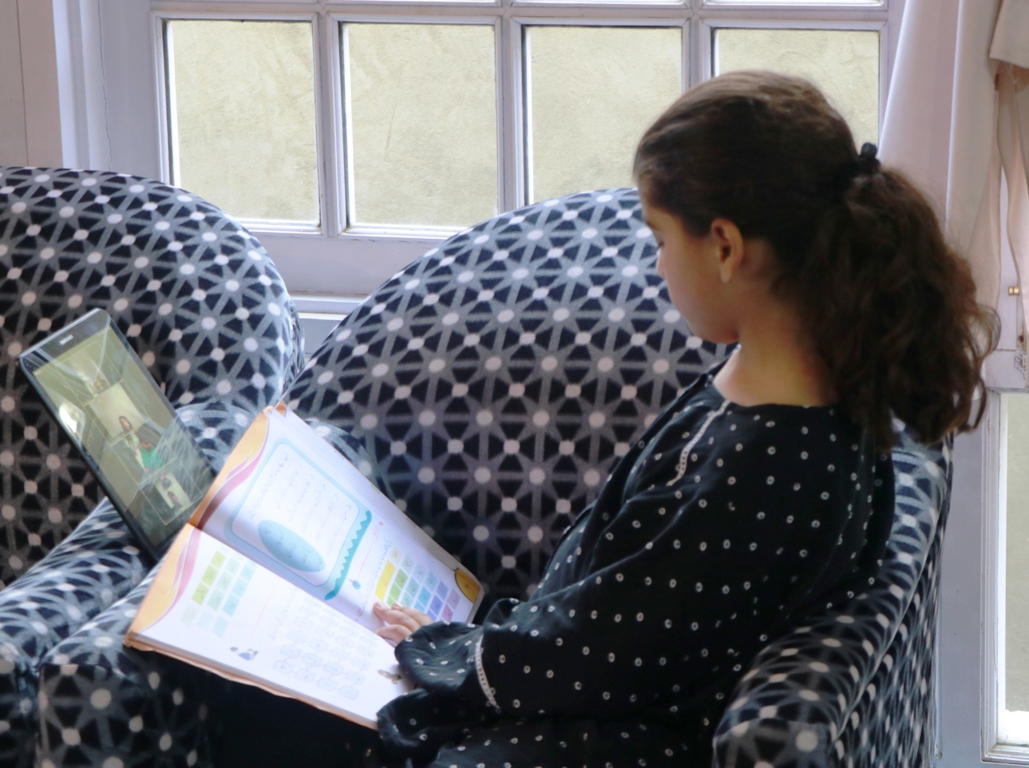Except for a fortnight-long reopening of educational institutions in March, the lingering yearlong security siege now melded with Covid-19 lockdown has effectively turned Kashmir into a country without access to education, reports Khalid Bashir Gura

When was the last time you saw the school bus honking on the road? Recall when kids at home woke up early to get ready, wearing a uniform, and rushing towards the bus stop. When was the last time you entered the classroom, flung chalk at your classmate, greeted teacher in person? It is a struggle to remember. It seems like an age has passed.
This all, makes Hashim Farooq, a class third student in Srinagar to miss school. He wants to switch off the phone of his parents and leave the routine of attending online classes and rush to the offline traditional classroom.
Flashback
Schools were reopened on February 24, seven months after the abrogation of Article 370 on August 5 last year as the lockdown was eased in Kashmir. Though to bring a semblance of normalcy, the administration had earlier tried to reopen schools in mid-August and the first week of October in 2019 but it failed. Parents were afraid to send their children out amid the communications blackout and tense ground situation. Instead, parents were forced to travel miles to fetch study material for their wards in pen drives. This all was done to “compensate” for the loss of academics while monthly fees from parents were also demanded at the same time.
Later in 2019, in October, the Jammu and Kashmir Board of School Education (JKBOSE) released date-sheets for classes 10 and 12th. Likewise, the administration also geared up for college and university exams. As students pursuing higher studies were unable to attend colleges and universities, the administration directed them to take study material from their respective departments to prepare for exams.
At the end of the year, the students appeared in exams and passed.
There are almost 11,633 educational institutes across Kashmir with more than 100 thousand enrolments up to the higher secondary level.
Students Struggle
Danish Farooq and Tanzeela Tariq are like thousands of Kashmiri students who have seen little of formal school since last year. Enrolled in the tenth class in a private school, Danish breaks into a smile when he recalls last year’s final exams.
“They were dreamlike exams. We had not completed our syllabus as schools were shut. After a few months, we went to school where we were given study material, question papers and answer sheets,” he said. Tanzeela Tariq, his cousin adds: “We were asked to write exams at home and submit the answer sheets after a week. We just consulted our study material on our own and then wrote answers.”
Was it really an exam? The duo laughed.
Subsequently, in December, last year, a three-month-long winter break was announced in schools.
Pandemic Lockdown
Then came March and the nationwide pandemic lockdown forced educational institutions to close again. On March 11, a week before the first case was detected in Kashmir; the administration ordered the closure of all educational institutions, this time to contain the Coronavirus.
Amid the lockdown, the educational institutions switched to online classes. With downgraded internet, the access to learning and teaching is difficult unlike the rest of the country. One of the government teachers in Srinagar wishing anonymity said: “It is difficult for me to conduct classes online as the speed is excruciatingly slow as he has to upload material. The students also face difficulties with downloading of material.”
The teacher said that meaningful education has nothing to do with finishing the syllabus and burdening children with long hours in front of screens. Teaching is about interactive communication and when one can’t communicate effectively especially in a virtual mode in the absence of high speed what is the point?
In the on-line set-up, the teachers and students do not see each other, and at times they are unable to hear each other properly. Another government primary school teacher said managing digital classes are difficult and demanding. “Out of 25 students, only half of them are interested in the online mode of education. The lack of technical know-how among students and families due to age and social background, access and learning becomes an issue. I prefer conference calls or WhatsApp rather than other inconvenient apps like Zoom,” he said.
“At times students skip classes by not reciprocating phone calls or do not attend classes or have phones with parents who have their own work to do.”
Most of the students attend classes from their mothers’ phone as they are home all day.
Each districts zone receives digital data which gives information about the number of students and teachers engaged in classes and percentage of e-classes. On an average 80- 90 students and teachers are shown engaged. The protocol has been made by education authorities that all the students should be engaged. The school authorities have been directed by authorities to provide information about those who are not able to attend classes.
Going Online
One of the teachers while explaining procedures of new pedagogy said that online schooling relies on WhatsApp, Zoom, Google classes. “The teacher has to first shoot the lectures themselves and then upload them on WhatsApp. The teachers send and receive assignments from the students from WhatsApp and the links provided by schools and colleges.”
At 11.00 am, Danish and Tanzeela log from their individual phones to Zoom for three half-an-hour long classes with some breaks for refreshment. They are joined by more than 40 other students. “After attending classes, I finish my assignments,” Tanzeela said. “These days, I am preparing for online examinations.” The classes until now have been smooth for both the students owing to access and high speed at home.
Tahseen Qazi who is a higher secondary student in Srinagar, said: “I could not download the zoom for hours and when I did there is a struggle with buffering of audio and video lessons. Out of hundreds of students couple of student attends online lectures,” said Tahseen. Last year after the abrogation of Article 370 he managed to study offline and pass but this year it seems impossible as pandemic has shut traditional offline classes and the low speed of online classes has added to his agonies.
“I am in class 12 and up until now, my books are untouched. I cannot comprehend low speed online lectures. There are almost 200 more students and whenever I attend there are very few. My teacher phoned a few days back to enquire why I don’t attend classes. Today I did but due to low connectivity I got irked and left.”
Another high school private school student Illyas Akbar, a son of a government employee, said: “My parents have appointed a private tutor in proximity.”
The parents have cleared all the fees at school and the exams were conducted online. The objective question paper was sent online and within a prescribed time the students are supposed to send them back. “Many times my heart skipped a beat when I could not log in or send as I faced problems in sending back answer sheet,” said Illyas, who had another phone at his disposal to search for answers.
In order to ensure attendance Illyas keeps his phone logged in but rarely participates in the classroom as he says he does not have patience and concentration now.
Last year many teachers, students, researchers have had to leave the state and migrate to other states as a complete communication clampdown was imposed but this time they are finding themselves in a dilemma.
Zubair Farooq who studies in 4th semester at Islamia College of Science and Commerce misses his college, “I am already lagging one semester behind. I should have been in 5th semester but due to political uncertainty and now pandemic our semester got delayed,” said Zubair.
Keeping current pandemic in consideration and the economy that is already suffering the college has halved the examination fees of students.
Kashmiri students who have been studying in foreign universities and had to return because of the pandemic were equally flustered because of the absence of high speed. Many have had to install and buy broadband connections to keep up with the other students in and outside the country.
“Our universities are conducting online lecture,” says Salman Majeed one of the engineering students who pursue masters in Italy and attending them low-speed internet is unthinkable.
Open-air Classes
The year without schooling and successive lockdowns forced some teacher’s across Kashmir to come up with the open-air classes while adhering to standard operating procedures amidst pandemic like physical distancing, wearing masks simultaneously. The first such initiative came from congested old’ city where a mathematics teacher Muneer Alam, resumed classes for higher secondary students started classes – near the Eidgah, Srinagar’s largest prayer ground, mostly used for congregational prayers on the occasion of Eid.

Around 50-70 students gather at the open-air venue from as early as 5 a.m. and the classes end by 7: 00 a.m. Even before the first light of dawn cracks, these students even from far-off areas of Srinagar start gathering. “The timing suited us because it’s not noisy at morning and the movement is minimal, helping to avoid any contact and maintain social distancing,” Alam said adding that to learn mathematics especially of higher classes the classroom should be interactive like traditional ones. “The morning atmosphere and open – air space is perfect for studies.”
The teacher expressed his worries as those confined and cooped up inside homes. He said that attending virtual classes may not be able to cope up with future challenging exams competently as basics need to be cleared.
“Mere passing is not education. Many of those in higher classes have to appear in various national level competitive exams and I worry if the students have prepared and learned effectively,” he said.
The teacher believes that if high-speed internet functioned in Kashmir, students may have attended online classes more effectively and through other learning digital platforms like in the rest of the world.
The teacher has kept the open-air classes free for everyone.
Govt Initiatives
The educational broadcast by the government in times of pandemic enabled many students to learn through the medium of radio and television.
The Directorate of School Education (DSEK), Kashmir had started telecasts on March 26 through the Kashir channel of Doordarshan Kendra, Srinagar and presently two classes are aired daily covering the syllabus of elementary and secondary classes.
Earlier, the J&K government has also decided to provide 2,500 low-budget educational tablets to the students of classes 10 and 12 for augmenting their virtual learning experience.
Many of the students, Kashmir Life spoke to described disinterest in the classes via a mass medium like radio and television as they are tempted to flip the channels and also have consistent distractions at home.
GN Var, the head of Private Schools Association of Jammu and Kashmir, a group of 4,500 private schools, said that education has come to a standstill for more than a year. Prior to August 5 last, there were summer vacations in Kashmir and then suddenly before students could return to classes the sudden lock up made them lock up schools for months. The private schools’ association, along with a group of media professionals and doctors, had filed a plea in the Supreme Court challenging the internet curbs.
“There are government guidelines for online schooling but our kids have access to 2G only. All the interactive software and applications in the world today are 4G based. That’s why our students struggle with the online classes,” said Var.
Defending the withholding or half-salary disbursements to private school teachers he said: “Most of the schools have limited resources and parents have not paid fees yet. In big elite schools, there are no issues of funds as the students’ come from affluent families especially government employees. The students studying in small private schools belong to humble backgrounds and have difficulty thereby managing funds and disbursing salaries.
Principal Secretary Education (J&K) Asgar Hassan Samoon and Director, School Education, Kashmir, Mohammad Younis Malik did not reciprocate to repeated phone calls.
Teachers’ Plight
The successive lockdowns have made economy nosedive thereby entailing hardships for the students, teachers, schools and parents likewise.
People belonging to private and informal sector especially transport, tourism, teaching and other sectors have been struggling with their livelihood since more than a year, and the COVID has come as a double whammy as lakhs of people have been forced out of their jobs. Despite livelihood getting hit, parents have been clearing the fees of their kids as they do not want the debt to incur. But many private school teachers on the condition of anonymity said that their salaries are either withheld or have been paid only half salary.

Unlike government counterparts who have to teach fewer students, the onus is more on private teachers who have to deal with a large number of students and are more accountable but low paid. One of the private teachers at a leading private school at Pampore said their ordeal began last year.
“I frequently flip my message box to see if I have received the full salary, just enough to keep the hearth going. I have two kids and my husband is also a private teacher. I was compelled to do a job to support him,” she said.
Since last year almost all the teachers have been paid Rs 3000 per month. “Many months were not paid. We have been pleading to pay a decent amount as we have to struggle with this little amount. The school administration is blaming parents and limited resources,” she said.
Similarly, Shabir Ahmed, a government employee and the parent of three kids in Srinagar said, he clears the fees every month as he does not want debts to incur. “We have to keep in consideration our teacher community who depend on our fees. Why should I withhold if I am receiving my salary every month.”
Recently Abdul Rashid, General Secretary Houseboat Owners Association had appealed to Parents Association of Privately Administered Schools to waive off school fees for the period of August 2019- June 2020 as the tourism sector and the people associated with the business are out of work for more than a year.















